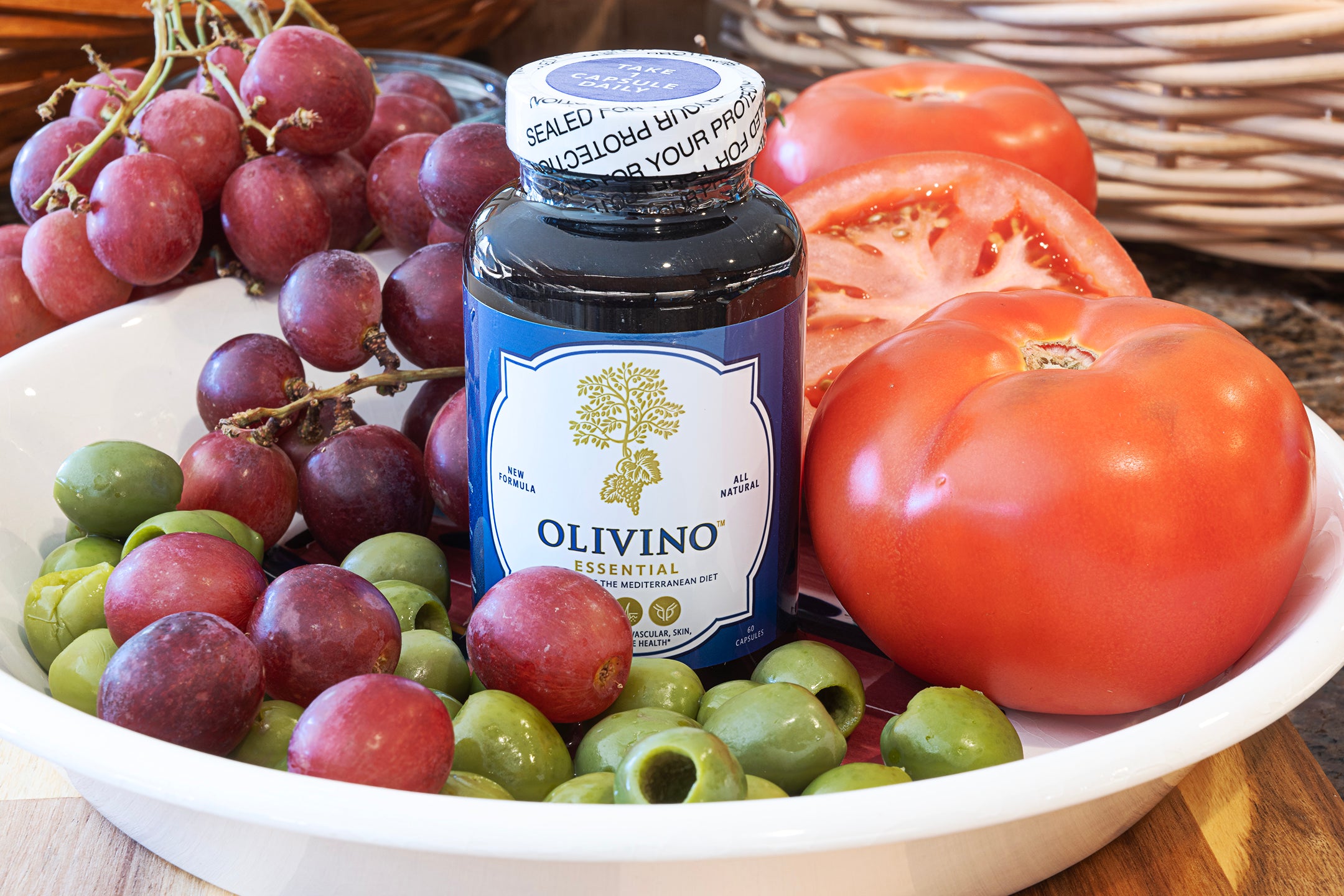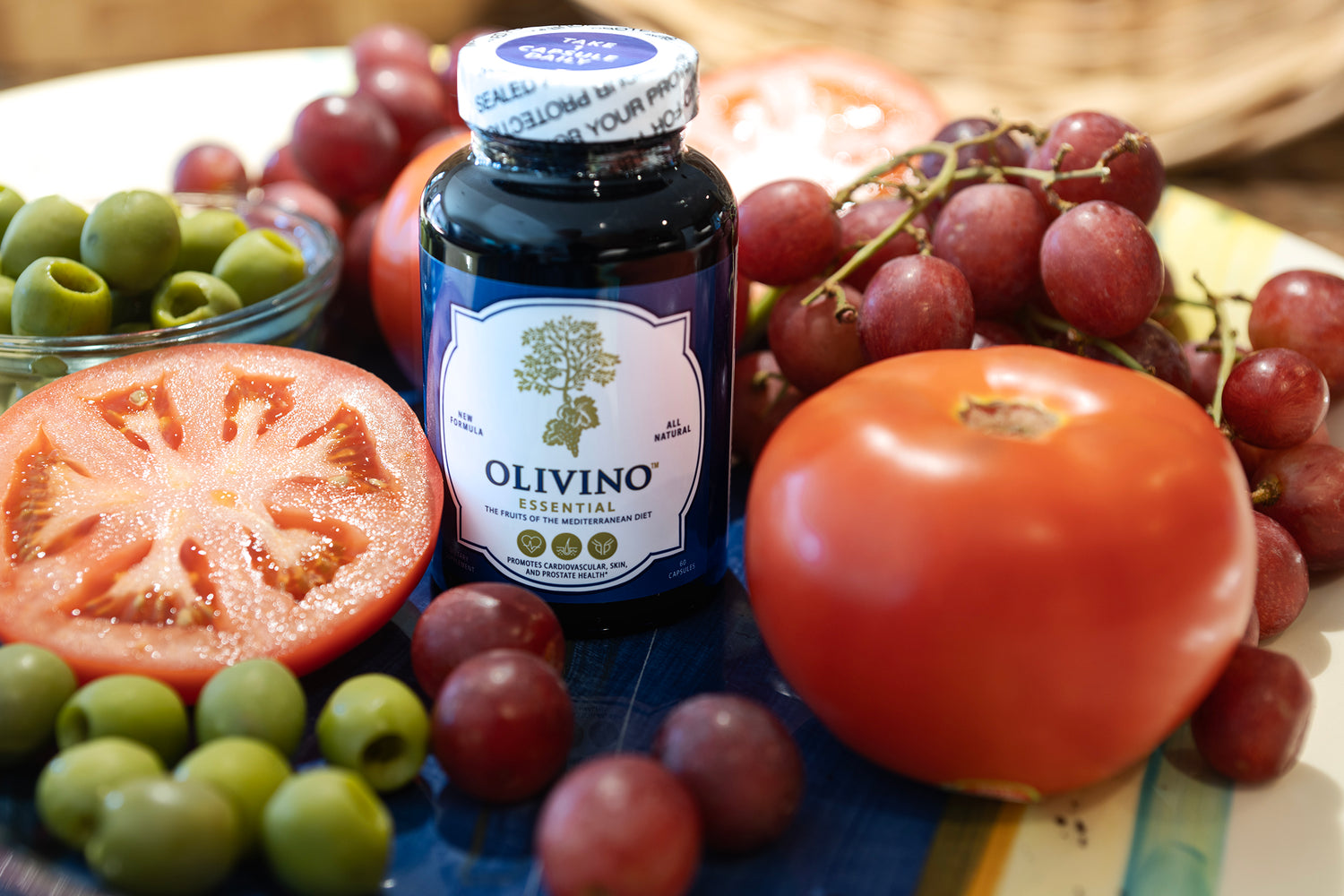The Science Behind OlivinoLife

OLIVE EXTRACT AND CARDIOVASCULAR HEALTH
Effects of Virgin Olive Oils Differing in Their Bioactive Compound Contents on Biomarkers of Oxidative Stress and Inflammation in Healthy Adults: A Randomized Double-Blind Controlled Trial.
Sanchez-Rodriguez E, Biel-Glesson S, Fernandez-Navarro JR, et al. Nutrients. Vol. 11 (2019): 1-14.
Key Findings: This randomized, crossover, controlled, double-blind trial study was conducted in 51 subjects. They received a daily dose of 30 ml (2 Tablespoons) of one of three different olive oils for 3 weeks with a 2-week washout period in between interventions: 1) an “optimized” virgin olive oil high in phenolic compounds, 2) a “functional” olive oil enriched with triterpenes (organic compounds found in olives), and 3) a virgin olive oil with reduced phenolic compounds. Triterpenes are a class of organic compounds found in plants. The olive oil polyphenols and tepenes decreased inflammation and DNA damage which is linked to heart disease. Taking extra amounts of these bioactive ingredients in a concentrated form could be beneficial for heart health.
Polyphenol Intake from a Mediterranean Diet Decreases Inflammatory Biomarkers Related to Atherosclerosis: A Substudy of the PREDIMED trial.
Medina-Remón A, Casas R, Tressserra-Rimbau A, et al. British Journal of Clinical Pharmacology. Vol. 83 (2017): 114-128.
Key Findings: Studies consistently suggest that the Mediterranean diet (MDiet), which includes olives and olive oil as primary components, is associated with a lower risk of cardiovascular diseases. This particular study showed that a MDiet can improve cardiovascular health by: 1) Improving blood lipids, specifically, increasing levels of HDL cholesterol and decreasing levels of LDL cholesterol; 2) Reducing both systolic and diastolic blood pressure; 3) Enhancing endothelial function, leading to better vasodilation and blood flow; and 4) Reducing inflammation and oxidative stress, both of which are key contributors to cardiovascular disease.
Platelet Aggregation Values in Patients with Cardiovascular Risk Factors are Reduced by Verbascoside Treatment. A Randomized Study.
Campo G, Pavasini R, Biscaglia S. Pharmacological Research. Vol. 97 (2015): 1-6
Key Findings: This study examined whether a substance called verbascoside, a natural compound found in olives and in Olivino™, could prevent blood platelets from sticking together. Preventing “platelet aggregation” is important for heart health. In this study, researchers gave verbascoside to 100 people with at least one risk factor for heart disease, such as having diabetes, high blood pressure, smoking, high cholesterol, or being overweight. They split the participants into three groups: one group got a placebo (fake treatment), one group got a low verbascoside dose (50mg), and one group got a higher verbascoside dose (100mg). Participants' platelet activity was measured before and after 2 weeks of treatment. The higher dose of verbascoside (100mg) significantly reduced platelet activity.
Olive Oil Polyphenols Decrease LDL Concentrations and LDL Atherogenicity in Men in a Randomized Controlled Trial.
Hernáez A, Fernández-Castillejo S, Farràs M. Arteriosclerosis, Thrombosis, and Vascular Biology. Vol. 34 (2014): 2115-2119.
Key Findings: This randomized, crossover, controlled trial included 47 healthy European men who ingested 25 mL/d (1.7 Tablespoon) of polyphenol-poor (2.7 mg/kg) or polyphenol-rich (366 mg/kg) olive oil in 3-week intervention periods, preceded by 2-week washout periods. HDL cholesterol efflux capacity significantly improved after consuming polyphenol-rich olive oil vs. the polyphenol-poor olive oil. HDL cholesterol efflux refers to the ability of HDL cholesterol (the "good" cholesterol), to remove excess cholesterol from the cells in your body and transport it back to the liver, where it can be broken down and removed. This helps prevent the buildup of cholesterol in the walls of arteries, which can lead to heart disease.
Inverse Association Between Habitual Polyphenol Intake and Incidence of Cardiovascular Events in the PREDIMED study.
Tresserra-Rimbau A, Rimm EB, Medina-Remón A, et al. Nutrition, Metabolism and Cardiovascular Diseases. Vol. 24 (2014): 539-447.
Key Findings: The aim of this study was to evaluate the association between intakes of total polyphenol intake and the risk of major cardiovascular disease (CVD) events, including myocardial infarction, stroke or death from cardiovascular causes in the PREDIMED study. “PREDIMED” stands for “PREvención con DIeta MEDiterránea" (Prevention with Mediterranean Diet), a clinical trial conducted in Spain involving 7172 participants. After 4.3 years of follow-up, those who consumed the most polyphenols had 46% reduction in risk of CVD.
Antioxidant Activity of Olive Polyphenols in Humans: A Review.
Raederstorff D. International Journal of Vitamin and Mineral Research. Vol. 79 (2009): 152-165.
Key Findings: Polyphenols found in olives have strong antioxidant abilities. These have been demonstrated in laboratory studies (in vitro) and studies on animals. Research involving humans has shown that olive polyphenols can decrease the levels of oxidized-Low Density Lipoprotein (LDL, a harmful form of cholesterol) in the bloodstream. Olive polyphenols also have positive effects on various markers of oxidative damage in the body. The antioxidant effects of olive polyphenols on LDL oxidation are noticeable with a daily dietary intake of about 10 mg.
The Effect of Polyphenols in Olive Oil on Heart Disease Risk Factors: A Randomized Trial.
Covas M-I, Nyyssönen K, Poulsen HE. Annals of Internal Medicine. Vol. 145 (2006): 333-341.
Key Findings: This randomized, crossover, controlled trial involving 200 healthy male volunteers was conducted in 6 research centers from 5 European countries. Participants were randomly assigned to 3 sequences of daily administration of 25 mL (1.7 Tablespoons) of 3 different olive oils: 1) Olive oil with low (2.7 mg/kg) medium (164 mg/kg), or high (366 mg/kg) phenolic content but otherwise similar. Intervention periods were 3 weeks preceded by 2-week washout periods. A linear increase in high-density lipoprotein (HDL) cholesterol levels was observed for low-, medium-, and high-polyphenol olive oil. Triglyceride levels decreased after consumption of all olive oils. Oxidative stress markers decreased linearly with increasing phenolic content. Researchers concluded that olive oil is more than a monounsaturated fat. Its phenolic content can also benefit plasma lipid levels and reduce oxidative damage.
OLIVE EXTRACT AND SKIN HEALTH
Effects of a Standardized Olive (Olea Europea) Fruit Extract on Healthy Skin Aging Parameters
Tongi S, Maramaldi G, Riva A, et al. Dermatological Experiences. Vol. 21: (2019): 6-10.
Key Findings: Opextan® is a standardized extract derived from Olive (Olea europaea) fruit, containing significant concentrations of polyphenols and the antioxidant verbascoside. Renowned for their potent antioxidant properties, these constituents play a pivotal role in fostering skin health. This investigation enlisted 67 healthy females who voluntarily ingested either Opextan® at 300 mg/day or remained untreated for skin-related concerns over a duration of 4 weeks. Multi-faceted evaluations of skin biochemistry and physiology were conducted at baseline and subsequent intervals, including assessments of water and oil content, exfoliation cell count, oxygen content, surface hydration, and hemodynamic parameters including nutritional and thermoregulatory blood flow, which is the amount of blood flowing through skin to help regulate body temperature. Women who took Opextan® exhibited progressive enhancements in skin moisture retention, reduction in exfoliation cell count, augmented oxygenation, and reduced carbon dioxide tension. Additionally, improvements were noted in skin thermoregulatory and nutritive flux, which simply refers to how skin helps control body temperature and supply nutrients to its various layers. These findings support Opextan® as a promising oral supplement conducive to "healthy aging," characterized by its ability to promote favorable skin aging dynamics and enhance skin resilience.
Photoprotective and Antioxidant Effects of a Standardised Olive (Olea Europea) Extract in Health Volunteers
Togni S, Maramaldi G, Conte C, et al. Dermatological Experiences. Vol. 17: (2015): 143-148.
Key Findings: The objective of this small clinical trial was to assess the photoprotective effects of a standardized olive extract, Opextan®, which is particularly rich in polyphenols. Three separate studies were conducted in healthy volunteers. In the first study, 19 subjects received 400 mg Opextan® for 28 days. Opextan® significantly reduced systemic oxidative stress by 36.4% as measured by urinary levels of 8-isoprostane. This molecule is formed in the body as a result of the oxidation of arachidonic acid, a type of polyunsaturated fatty acid found in cell membranes. Measuring 8-isoprostane is considered a reliable marker of oxidative stress in the body. In the second study, 6 volunteers had Opextan® applied topically for 28 days and skin redness after exposure to UV light was measured. Opextan® significantly reduced UV-induced lipid peroxidation by 27.1% vs. placebo. The third study involved 13 volunteers who took 160 mg Opextan® as a dietary supplementfor 28 days. Opextan® significantly increased (by 14.5%) the minimal erythemal dose (MED). The MED isthe least amount of sunlight exposure that will cause skin to turn red (erythema) after a certain period of time, i.e., a measure of how sensitive skin is to the sun's ultraviolet (UV) rays. These observations indicate that Opextan® exerts photoprotective effects because of its antioxidant properties.

BENEFITS BACKED BY SCIENCE
- Promotes cardiovascular health
- Helps maintain healthy blood pressure
- Fights inflammation
- Protects against free radicals that can damage skin
- Helps maintain a healthy blood sugar level
- Promotes healthy prostate function


